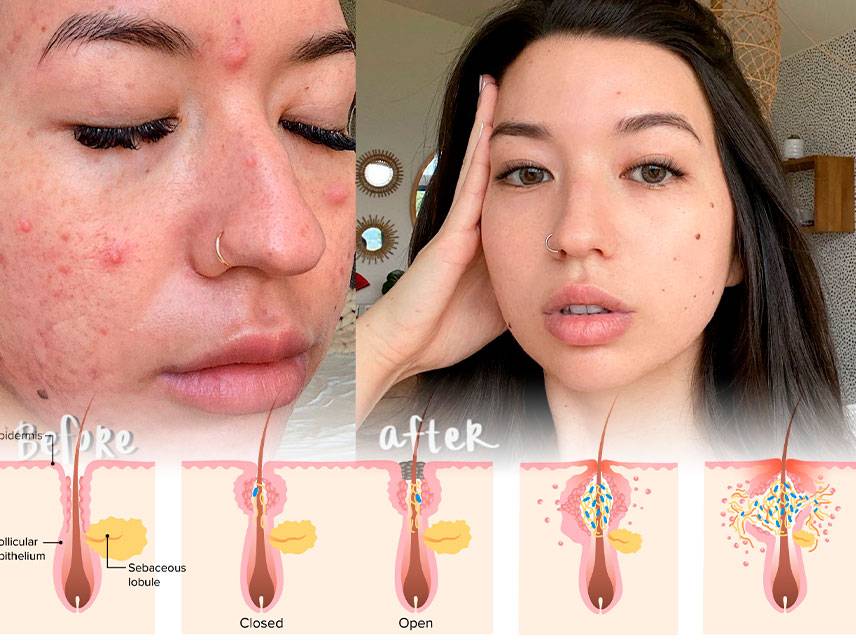Acne vulgaris is a common, chronic skin condition that affects many people. It is characterized by the appearance of pimples, blackheads, whiteheads, and other blemishes, which can be painful and embarrassing. Acne vulgaris occurs when hair follicles become blocked by oil and dead skin cells. It is a long-term skin disorder that is usually seen in adolescents, but it can also affect adults.
What is acne vulgaris and how is it caused?
Acne vulgaris is a common skin disorder that is characterized by the appearance of pimples, blackheads, whiteheads, and other blemishes. It is caused by the overproduction of oil and dead skin cells, which clog the hair follicles and create a breeding ground for bacteria. The bacteria then feed on the oil and dead skin cells, further exacerbating the condition.
What is the difference between acne and acne vulgaris?
Acne and acne vulgaris are two different conditions. Acne is a general term for pimples, blackheads, whiteheads, and other blemishes that can appear on the face, neck, chest, back, and shoulders. Acne vulgaris is a specific type of acne that is caused by the overproduction of oil and dead skin cells, which clog the hair follicles and create a breeding ground for bacteria.
What does acne vulgaris look like?
Acne vulgaris usually appears as pimples, blackheads, whiteheads, and other blemishes. These blemishes can be painful and embarrassing, and can range in size from small bumps to large cysts.
What acne vulgaris means?
Acne vulgaris is a skin disorder that is caused by the overproduction of oil and dead skin cells, which clog the hair follicles and create a breeding ground for bacteria. It is characterized by the appearance of pimples, blackheads, whiteheads, and other blemishes.
Who is most affected by acne vulgaris?
Acne vulgaris is most prevalent in adolescents, but it can also affect adults. It is more common in people with oily skin, but it can affect people of all skin types.
Does acne vulgaris ever go away?
Acne vulgaris is a chronic condition, and it can take several months or even years to clear up. However, with the right treatment and lifestyle changes, it can be managed.
What is the best treatment for acne vulgaris?
The best treatment for acne vulgaris depends on the severity of the condition. Mild cases may be treated with over-the-counter medications, while more severe cases may require prescription medications. In some cases, a combination of medications and lifestyle changes may be necessary to manage the condition.
What are the 4 stages of acne vulgaris?
The four stages of acne vulgaris are comedonal, inflammatory, cystic, and scarring. The comedonal stage is characterized by the appearance of blackheads and whiteheads. The inflammatory stage is characterized by the appearance of pimples and papules. The cystic stage is characterized by the appearance of cysts, which are large, painful, and deep-seated. The scarring stage is characterized by the appearance of scarring from the previous stages.
At what age does acne vulgaris go away?
Acne vulgaris typically begins at puberty and is most common in teenagers and young adults. However, it can persist into adulthood, and there is no specific age at which it will go away.
How do you prevent acne vulgaris?
The best way to prevent acne vulgaris is to keep the skin clean and free of excess oil and dead skin cells. This can be done by using a mild cleanser twice daily and avoiding harsh cleansers and scrubs. Wearing non-comedogenic makeup and moisturizers and avoiding touching the face can also help to prevent acne vulgaris.
What food causes acne vulgaris?
Certain foods, such as processed foods, dairy products, and sugary drinks, can increase the risk of developing acne vulgaris. Eating a balanced diet with plenty of fruits and vegetables can help to reduce the risk of developing acne vulgaris.
Acne vulgaris is a common, chronic skin condition that affects many people. It is characterized by the appearance of pimples, blackheads, whiteheads, and other blemishes, which can be painful and embarrassing. Acne vulgaris is caused by the overproduction of oil and dead skin cells, which clog the hair follicles and create a breeding ground for bacteria. The best way to manage acne vulgaris is to keep the skin clean and free of excess oil and dead skin cells, and to eat a balanced diet with plenty of fruits and vegetables. With the right treatment and lifestyle changes, acne vulgaris can be managed.





